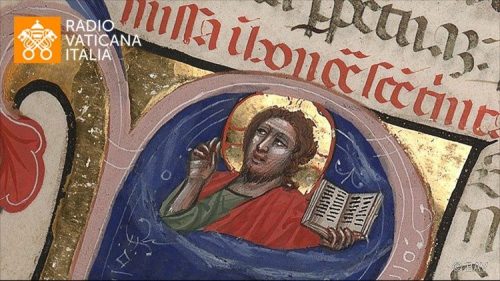READING OF THE DAY
TI 1:1-9
Paul, a slave of God and Apostle of Jesus Christ
for the sake of the faith of God’s chosen ones
and the recognition of religious truth,
in the hope of eternal life
that God, who does not lie, promised before time began,
who indeed at the proper time revealed his word
in the proclamation with which I was entrusted
by the command of God our savior,
to Titus, my true child in our common faith:
grace and peace from God the Father and Christ Jesus our savior.
For this reason I left you in Crete
so that you might set right what remains to be done
and appoint presbyters in every town, as I directed you,
on condition that a man be blameless,
married only once, with believing children
who are not accused of licentiousness or rebellious.
For a bishop as God’s steward must be blameless, not arrogant,
not irritable, not a drunkard, not aggressive,
not greedy for sordid gain, but hospitable, a lover of goodness,
temperate, just, holy, and self-controlled,
holding fast to the true message as taught
so that he will be able both to exhort with sound doctrine
and to refute opponents.
GOSPEL OF THE DAY
LK 17:1-6
Jesus said to his disciples,
“Things that cause sin will inevitably occur,
but woe to the one through whom they occur.
It would be better for him if a millstone were put around his neck
and he be thrown into the sea
than for him to cause one of these little ones to sin.
Be on your guard!
If your brother sins, rebuke him;
and if he repents, forgive him.
And if he wrongs you seven times in one day
and returns to you seven times saying, ‘I am sorry,’
you should forgive him.”
And the Apostles said to the Lord, “Increase our faith.”
The Lord replied, “If you have faith the size of a mustard seed,
you would say to this mulberry tree,
‘Be uprooted and planted in the sea,’ and it would obey you.”
WORDS OF THE HOLY FATHER
Pope Francis warned in the Mass celebrated Monday, [..] in Santa Marta from the small and big “inconsistencies of every day” – those that are seen even in churches or are committed by Christians who in the world of work give “scandal”.
«Jesus begins this passage of the Gospel – he immediately pointed out referring to the liturgical passage of the Gospel of Luke (17, 1-6) – with a statement of common sense:” It is inevitable that there are scandals “». And in fact “it is inevitable” said Francisco: scandals “there are, there will be”. But Jesus makes “a warning that is confirmation and warning” at the same time: “Woe to the one for whom the scandals come”.
Therefore the Lord sends “a strong warning” and goes also “beyond”, adding: “It would be better for him to put a millstone around his neck and be thrown into the sea, than to scandalize one of these little ones.” But it does not end here, the Pontiff observed. The Lord in fact “addressing his own says:” take care of yourselves “; that is, be careful not to scandalize ». The Pope explained that “scandal is ugly because it hurts the vulnerability of the People of God, hurts the weakness of the People of God, and often these wounds are taken for life.” Moreover, the scandal, the Pope explained, “not only hurts” but “is capable of killing: killing hopes, killing illusions, killing families, killing many hearts”.
The scandal is “a subject on which Jesus returned” often, said the Pontiff. For example “after a preaching he had said:” Blessed are those who are not scandalized by me “». Because “He was careful not to scandalize.” And, even, «when it was time to pay the fees, not to” scandalize “says to Pedro:” Go to the sea, catch a fish, take the coin you have in your mouth and pay for you and me “». Always “so as not to scandalize,” Jesus also warns: “If your hand is scandalous, cut it off.” And then, again, “Peter, when he is in front of the cross, of the project of the cross, tries to convince him to take another path, he does not make so many nuances:” Get away from me, you want to make me stumble, you are a scandal for me ” »
Dunque il Signore lancia «a forte avvertimento» e va anche «oltre», aggiungendo: «è meglio per lui che gli come messa al collo a macina da mulino e sia gettato nel mare, piuttosto che scandalizzare uno di questi piccoli».
“Jesus in this is very precise,” Francisco explained. And “to us, to all” gives “this warning:” be attentive to yourselves! “». Because “there is the scandal of the People of God, of Christians, when a Christian, saying he is a Christian, lives as a pagan.” On the other hand, the Pope affirmed, “how many times in our parishes have we heard people say:” No, I do not go to church because that one or that one who is all day lighting the candles in there, then goes out, speaks ill of the others, sow weeds … “».
And “how many Christians,” the Pontiff said, “lead people away by their example, with their incoherence: the incoherence of Christians is one of the easiest weapons the devil has to weaken the People of God and to alienate the People of God of the Lord ». It is the style of “saying one thing and doing another”. Precisely “what Jesus said to the people about the doctors of law:” Do what they say, do not do what they do “». This is “incoherence.”
In this regard, the Pope did not stop suggesting “ask each other today, each one of us: how is my coherence of life?”. In my life there is «coherence with the Gospel, coherence with the Lord?». Ask yourself, therefore, «if by my incoherence I am cause for scandal for others».
And incoherent, explained the Pontiff, is also the Christian who says: “I go every Sunday to Mass, I am of Catholic action or of this association or of the other, but I pay in black to my workers or I make a contract from September to June “-” And July and August? “-” fix them dear! “». Precisely these are the “everyday inconsistencies.” But scandal is also “business Christians who do not pay just” and take advantage of “people to get rich.”
True, Francisco continued, “then we can ask ourselves about the scandal of the shepherds, because in the Church we are also pastors.” The prophet Jeremiah, “spoke of this “woe to you”” referring precisely to the “shepherds who exploit people, exploit the sheep, to enrich themselves seek milk or wool, says Jeremiah, to dress and vanity , but they do not care for the sheep ».
Then there is also “the scandal of the pastor who starts, for example, to get away from the people: the distant shepherd”. However, “Jesus teaches us that the pastor must be close and when the pastor goes away he is scandalized: he is a” lord “». In fact, “Jesus tells us that you can not serve two masters, God and money: when the pastor is one who is clinging to money, he is scandalized.” And “people are scandalized” seeing “the shepherd clinging to money,” reiterated the Pontiff. For this reason, “each pastor must ask himself: how is my friendship with money?”
There is also the scandal of the “pastor who tries to go up: vanity leads him to climb, instead of being meek, humble, because meekness and humility favor closeness to the people.” Or the scandal of the “shepherd who feels” sir “and sends to all, proud, and not the shepherd servant of the people of God».
You could continue on these things, said Francisco. He remembers it “Jeremiah, and St. Augustine also takes this” thought “of Jeremiah and makes a long discourse on the shepherds». And so you could go ahead, said the Pope, “but this, I think, for today will be enough to ask us, each of us: scandalized as a Christian, as a Christian, as a pastor? Scandalized? Did I hurt the vulnerability of my people? Instead of attracting the people, to make one happy, to give peace, consolation, I expel it because I feel like a pastor “sir” or I feel a Christian more important than you? ».
Do not forget Jesus’ warning to the disciples: “Be attentive to yourselves!” This is how, Francisco concluded, “today can be a nice day to do an examination of conscience about this: scandalized or not and how?” And “so we can respond to the Lord and get a little closer to him”.
(Santa Marta, 13 November 2017)

